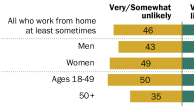Currently there are nearly 35 million Hispanics in the U.S., making them the second-largest ethnic group in the country. But the effect of the current recession on this important group is unknown. Yet, it is unlikely that all Hispanics have been similarly affected by the recession. Hispanics are a varied group not just in terms of national origin, but also in terms of time in the U.S., ranging from newly arrived immigrants to U.S.-born Hispanics. This report examines how three generations of Hispanics have fared in September and October 2001, compared to September 2000 and September 1999. The report finds that
• Mexican Americans have had a smaller increase in unemployment than other Hispanics, 6.5 percent compared to 7.7 percent, in October 2001;
• The second generation averages higher unemployment rates for both Mexican Americans (8.7 percent) and other Hispanics (10.1);
• Hispanics in manufacturing, wholesale and retail, and transportation industries have been particularly hard hit;
• Unemployed first-generation Hispanic workers are concentrated in laborer and operator jobs, while second- and third-generation workers are more likely to work in service, and sales and technical occupations; • Immigrants finding information about jobs through friends, and directly contacting employers;
• Immigrant relatives and second- and third-generation children, in particular, tend to live in a household not their own, perhaps as a way to cope with the adverse effects of unemployment.




